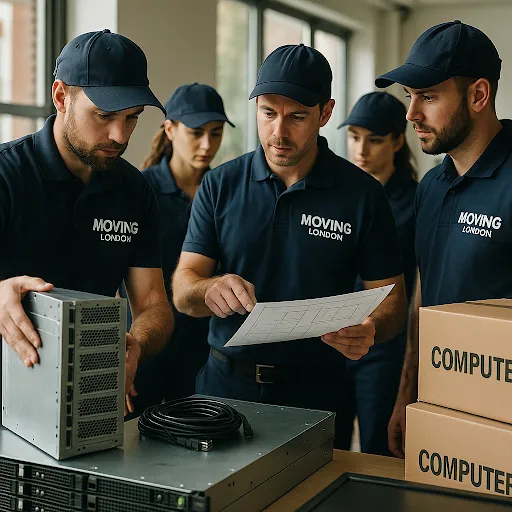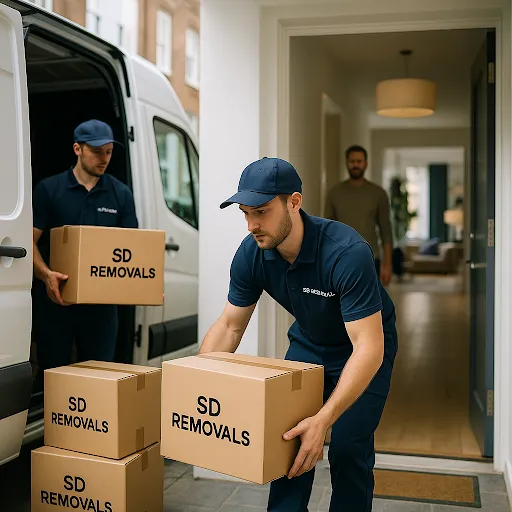If you’re planning an office move in London, you already know it’s not as simple as packing a few boxes and calling a van. A proper Commercial relocation is about keeping your business running while everything is in motion and that takes planning, the right moving partner, and a solid plan for your IT equipment.
Key Takeaways (Quick Version)
- Hiring professional movers in London helps reduce downtime and stress.
- IT relocation and insurance aren’t “extras” — they’re essentials.
- A small or mid-sized office move usually costs between £1,500 and £10,000.
- Book at least 6–8 weeks ahead; top movers fill their calendars fast.
- Look for transparency, full project management, and strong insurance cover.
What Do Commercial Movers Actually Do?
Think of them as your project managers with vans. A proper London relocation service handles the planning, packing, and safe transport of your business assets. That means everything from IT gear and office furniture to on-site coordination and even temporary storage if needed.
The full package usually includes:
- Planning and project management.
- Packing and reassembling furniture.
- IT transport and setup.
- On-site coordination on moving day.
- Short- or long-term storage, if you need breathing space.
Why Bother With Professionals?
Because moving an office is risky business. Without the right people, downtime drags on, expensive kit gets damaged, and staff lose productivity. With pros, you get:
- Less downtime.
- Specialist handling of IT equipment.
- Clear project plans.
- Insurance cover if something goes wrong.
Here’s a reality check: about 75% of UK office moves run into problems when planning is weak. And IT managers? Over 60% say data security is their biggest concern.
How to Plan a London Office Move
Here’s the roadmap most businesses follow:
- Define your scope, timeline, and success goals.
- Put together a move team (decision-makers included).
- List assets and highlight IT/AV needs.
- Create a big-picture plan and start collecting quotes.
- Map out your new space and schedule move-day details.
- Prepare IT and backup plans — always have a rollback option.
- Execute the move, either in phases or all at once.
- Test everything post-move and run a quick debrief.
What to Check Before Hiring a Mover
Not all movers are equal. In London, you’ll want someone who offers:
- End-to-end project management.
- Proven IT relocation expertise.
- Packing, disassembly, secure transport, and storage.
- Proper insurance and accreditations.
- Transparent quotes with no hidden extras.
Pro tip: ask for case studies and service-level agreements. Local London knowledge is also a bonus knowing which loading bays and permits are needed can save you a headache.
IT Relocation: Don’t Leave It to Chance
Moving your IT is where the real stress kicks in. Servers, racks, cabling, and GDPR compliance can’t be left to “whoever’s free on the day.” Good providers will:
- Decommission and recommission equipment.
- Label cables and racks for smooth setup.
- Use secure packing for sensitive gear.
- Provide chain-of-custody documentation.
- Run tests before handing everything back.
What Will It Cost?
Every office move is different, but the big factors are:
- Size of your office.
- IT setup complexity.
- Distance and access (stairs, lifts, parking).
- Storage or extra services.
Expect quotes to be itemised and transparent. In London, a typical small-to-medium move runs £1,500–£10,000. You might save money with phased moves or off-peak scheduling.
Real-Life Examples
- A finance firm in Canary Wharf shifted 50 staff and servers over one weekend up and running by Monday morning.
- An SME in Islington staged its IT move to avoid downtime.
- A national retailer used storage during refurb and completed the move in stages.
Final Thoughts
An in-house move may sound cheaper, but without the right kit and insurance, it often costs more in downtime. Professional movers bring expertise, liability cover, and speed.
If you’re getting ready to relocate, start with an asset list and floor plan, then book consultations. London movers like SD Removals offer free assessments and IT relocation support: SD Removals – Commercial Removals London.
Book early, ask the right questions, and your move will feel far less painful.
FAQs (Straight Answers)
How do I minimise downtime?
Schedule after-hours or weekend moves, and get an IT crew who knows what they’re doing.
How far in advance should I book?
Six to eight weeks is normal, longer in peak season.
Is IT relocation included?
With good movers, yes but always confirm GDPR compliance.
Do they operate outside business hours?
Absolutely. Many prefer it to avoid disruption.
Is insurance included?
Most movers include basic transit insurance, but check the limits and ask about add-ons for high-value kit.






